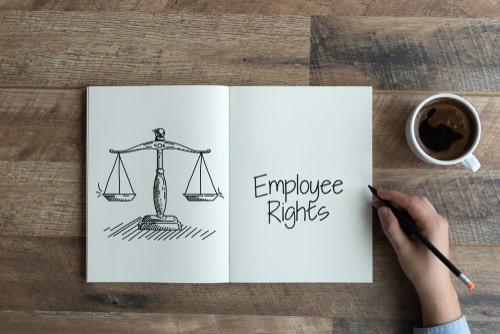
 847-995-1205
847-995-1205
Recent Blog Posts
Minimum Wage Violations for Tipped Employees in Illinois
 As an employer in Illinois, you are responsible for paying your tipped employees the minimum wage. The Illinois Minimum Wage Act (IMWA) sets the minimum wage for tipped employees at $7.80 per hour as long as the employee's tips bring their total earnings up to the state minimum wage of $13.00 per hour. However, there are a number of rules and regulations that you must follow in order to comply with the IMWA.
As an employer in Illinois, you are responsible for paying your tipped employees the minimum wage. The Illinois Minimum Wage Act (IMWA) sets the minimum wage for tipped employees at $7.80 per hour as long as the employee's tips bring their total earnings up to the state minimum wage of $13.00 per hour. However, there are a number of rules and regulations that you must follow in order to comply with the IMWA.
What If My Tipped Employees Do Not Make Enough Tips to Reach the Minimum Wage?
If your tipped employees do not make enough tips to reach the minimum wage, you may be required to make up the difference. This is called the tip credit. An employer can pay tipped employees $7.80 per hour in wages, plus $3.30 per hour in tips, as long as the employee's total earnings reach the state minimum wage of $13.00 per hour. If the employee's tips average $20 or more per month, as an employer, you will not be required to make up the difference.
“Hiring” Independent Contractors Versus Employees: What You Need to Know
 As a business owner, you likely take great pride in your work. Yet, when too many tasks fall on the shoulders of one individual, the quality of that person's work may slip and deadlines may be missed. If you are thinking about hiring someone to help lighten your company's workload, it is important to understand what your options are and the potential benefits and drawbacks of embracing each approach.
As a business owner, you likely take great pride in your work. Yet, when too many tasks fall on the shoulders of one individual, the quality of that person's work may slip and deadlines may be missed. If you are thinking about hiring someone to help lighten your company's workload, it is important to understand what your options are and the potential benefits and drawbacks of embracing each approach.
Generally speaking, you can hire employees or you can engage the services of independent contractors. Even if you opt to work with an employment vendor, you will need to understand the implications of whether that vendor's workers are classified as independent contractors versus employees of that company. This information can help you to make informed choices that could impact your company's risk of liability, its internal practices, and your obligations to those new people who will help you to operate your business.
What Employers Should Know About the One Day Rest In Seven Act (ODRISA)
 Worker shortages, inflation, the rising cost of supplies, and other factors have made it difficult for many Illinois businesses to keep their doors open. A significant percentage of businesses are understaffed, and existing employees are often asked to work extra shifts or longer hours to compensate for this.
Worker shortages, inflation, the rising cost of supplies, and other factors have made it difficult for many Illinois businesses to keep their doors open. A significant percentage of businesses are understaffed, and existing employees are often asked to work extra shifts or longer hours to compensate for this.
However, as an employer, it is essential that you understand your obligations and limitations under Illinois and federal law. In this blog, we will discuss the One Day Rest in Seven Act and how it can influence employee work schedules.
ODRISA Requires Employers to Provide Breaks to Workers
Governor JB Pritzker signed Bill 3146, in May of last year. The bill amends the One Day Rest In Seven Act (ODRISA) and adds additional provisions all Illinois employers should be aware of. The new legislation went into effect on January 1, 2023.
As the name suggests, the One Day Rest In Seven Act requires employers to give workers at least 24 hours of rest every seven consecutive days. If a worker voluntarily chooses to work a seventh day, the employer may ask the Illinois Department of Labor for permission to schedule the worker above and beyond the seven-day limitation.
When Can Employers Be Penalized for Retaliating Against Employees?
 Retaliation in the workplace is a serious issue that can lead to numerous legal complications for employers. Employees have certain rights, and employers may be accused of violating these rights if they penalize an employee in response to certain actions. For employers, it is important to know what types of disciplinary actions against employees are allowed and what may constitute a violation of the Fair Labor Standards Act or other laws and regulations.
Retaliation in the workplace is a serious issue that can lead to numerous legal complications for employers. Employees have certain rights, and employers may be accused of violating these rights if they penalize an employee in response to certain actions. For employers, it is important to know what types of disciplinary actions against employees are allowed and what may constitute a violation of the Fair Labor Standards Act or other laws and regulations.
What Is Retaliation?
Retaliation refers to any adverse action taken by an employer against an employee in response to protected activity. These actions may include terminating or demoting an employee, reducing an employee's hours or lowering their wages, or other types of negative treatment. An employer who is accused of retaliation may face legal action from employees or former employees, investigations by federal or state government organizations, and penalties such as the requirement to pay fines or reimburse employees for lost wages.
When Can Illinois Employers Face Violations Related to Overtime Pay?
 If you are an employer in Illinois, then you are responsible for following the overtime pay regulations set by the Fair Labor Standards Act (FLSA). According to the FLSA, employees must receive overtime pay for all of the hours they work beyond the standard 40-hour workweek. Overtime is usually calculated at a rate of 1.5 times the employee's regular pay. If you fail to comply with overtime regulations, you may face expensive fines and legal action. By understanding the situations that may lead to overtime violations, you can take steps to avoid these issues and protect against potential consequences. Some common issues that can lead to overtime violations include:
If you are an employer in Illinois, then you are responsible for following the overtime pay regulations set by the Fair Labor Standards Act (FLSA). According to the FLSA, employees must receive overtime pay for all of the hours they work beyond the standard 40-hour workweek. Overtime is usually calculated at a rate of 1.5 times the employee's regular pay. If you fail to comply with overtime regulations, you may face expensive fines and legal action. By understanding the situations that may lead to overtime violations, you can take steps to avoid these issues and protect against potential consequences. Some common issues that can lead to overtime violations include:
Failure to Pay Overtime
One of the most common violations related to overtime pay in Illinois occurs when employers do not pay employees their rightful overtime wages. Under the FLSA, employees are entitled to receive overtime pay of 1.5 times their regular hourly wages for any hours worked beyond 40 hours in a workweek. Employers who fail to pay overtime may face legal charges and can be required to pay back wages, damages, and legal fees.
5 Common Employer Violations of the Fair Labor Standards Act
 Navigating the complexities of the Fair Labor Standards Act (FLSA) can be a daunting task for employers, regardless of their industry, size, or experience. However, small business owners may encounter confusion about whether the FLSA applies to them and what requirements they will need to meet. Certain requirements apply to all businesses, while others may apply based on the type of business, the annual sales volume, and the number of employees. Failure to comply with the FLSA can result in significant fines and penalties or potential lawsuits. By understanding some of the most common ways that businesses violate the FLSA, employers can ensure that they remain in compliance to avoid potential pitfalls.
Navigating the complexities of the Fair Labor Standards Act (FLSA) can be a daunting task for employers, regardless of their industry, size, or experience. However, small business owners may encounter confusion about whether the FLSA applies to them and what requirements they will need to meet. Certain requirements apply to all businesses, while others may apply based on the type of business, the annual sales volume, and the number of employees. Failure to comply with the FLSA can result in significant fines and penalties or potential lawsuits. By understanding some of the most common ways that businesses violate the FLSA, employers can ensure that they remain in compliance to avoid potential pitfalls.
When Does the FLSA Apply to a Business?
In most cases, a business's employees will be covered by the FLSA if the business has annual gross sales of $500,000 or more. In certain industries, the number of people a business employs may also affect coverage. However, regardless of the size of the business, if an employee handles money or goods that are part of "interstate commerce," they will be covered. So, for example, if an employee accepts credit card payments from customers, they will be covered by the FLSA.
When Do Employers Need to Provide Accommodations to Disabled Employees?
 When it comes to workplace accommodations for disabled employees, there are a few things that employers need to know. Accommodations must be provided in order for disabled employees to have equal opportunities in the workplace and access to the same benefits as their non-disabled colleagues. It is important for employers to understand when they are legally required to provide accommodations so that they can ensure their business is compliant with federal and state laws. Employers who fail to meet these requirements could potentially face discrimination lawsuits from employees, and in these situations, they will have a burden of proof to show that they have complied with the applicable laws.
When it comes to workplace accommodations for disabled employees, there are a few things that employers need to know. Accommodations must be provided in order for disabled employees to have equal opportunities in the workplace and access to the same benefits as their non-disabled colleagues. It is important for employers to understand when they are legally required to provide accommodations so that they can ensure their business is compliant with federal and state laws. Employers who fail to meet these requirements could potentially face discrimination lawsuits from employees, and in these situations, they will have a burden of proof to show that they have complied with the applicable laws.
When Do Employers Need To Provide Accommodations?
Under the Americans with Disabilities Act (ADA), employers are required to provide reasonable accommodations for qualified individuals with disabilities in order to allow them to perform essential job functions. Under the ADA, a disability may include any physical or mental impairment that has substantially limited an employee's ability to complete tasks or participate in regular activities in the workplace or in their personal life. Disabled employees may request reasonable accommodations, and employers are generally required to address these needs as best as possible unless doing so would create an undue hardship on the business. Undue hardship may involve significant difficulties that affect other employees or limit the employer's ability to do business, as well as unreasonable expenses that exceed the employer's financial resources.
Can Employers Face Penalties for Interfering With Employee Rights?
 Employers have a legal obligation to ensure that their employees are treated fairly and with respect. Violating the rights of employees can result in stiff penalties from government entities, including fines, the requirement to pay monetary damages to employees or former employees, or even potential jail time in certain situations. It is important for employers to understand the types of activities that are prohibited and the potential consequences that they may face if they violate the rights of their employees. Employers will also need to understand the burden of proof that will apply if they are accused of committing these types of violations.
Employers have a legal obligation to ensure that their employees are treated fairly and with respect. Violating the rights of employees can result in stiff penalties from government entities, including fines, the requirement to pay monetary damages to employees or former employees, or even potential jail time in certain situations. It is important for employers to understand the types of activities that are prohibited and the potential consequences that they may face if they violate the rights of their employees. Employers will also need to understand the burden of proof that will apply if they are accused of committing these types of violations.
Employee Rights and Protected Employee Activities
There are multiple federal and state laws that apply to the relationships between employers and employees, including the National Labor Relations Act (NLRA), the Whistleblower Protection Act (WPA), and equal employment opportunity (EEO) laws. Under these laws, employers may be penalized for engaging in activities such as:
What Are the Consequences of Misclassifying Employees in Illinois?
 Employers may hire multiple different types of workers, but they will need to be sure these workers are classified correctly. Inaccurate worker classification—which labels someone an independent contractor when they should be classified as an employee—can result in significant penalties that could have an impact on a business's bottom line. By understanding the potential penalties, employers can ensure that they take the necessary steps to classify workers correctly.
Employers may hire multiple different types of workers, but they will need to be sure these workers are classified correctly. Inaccurate worker classification—which labels someone an independent contractor when they should be classified as an employee—can result in significant penalties that could have an impact on a business's bottom line. By understanding the potential penalties, employers can ensure that they take the necessary steps to classify workers correctly.
Classifying Workers as Employees or Independent Contractors
Employees work directly for an employer, and they are entitled to certain benefits, including coverage by workers' compensation insurance, the ability to collect unemployment benefits, the right to receive minimum wage and overtime pay, and the ability to receive benefits such as health insurance through an employer. Independent contractors are considered to be self-employed, and most of these benefits will be unavailable to them. To determine how workers should be classified, employers will need to consider rules put in place at both the state and federal level. These include:
When Can Illinois Employers Classify Employees as Exempt?
 Every employer needs to understand the laws and regulations surrounding employee classification. The Fair Labor Standards Act (FLSA) outlines the rules for classifying employees as exempt or non-exempt. In Illinois, employers need to be aware of certain rules when it comes to classifying employees. Understanding the nuances between the different classifications can help protect a business from liability down the line.
Every employer needs to understand the laws and regulations surrounding employee classification. The Fair Labor Standards Act (FLSA) outlines the rules for classifying employees as exempt or non-exempt. In Illinois, employers need to be aware of certain rules when it comes to classifying employees. Understanding the nuances between the different classifications can help protect a business from liability down the line.
Understanding the Difference Between Exempt and Non-Exempt Employees
The federal Fair Labor Standards Act establishes criteria for employers to use when determining whether an employee should be classified as exempt or non-exempt. The FLSA also sets minimum wage and overtime pay requirements for non-exempt employees. Exempt employees are not subject to these requirements, meaning that their wages are not based on hours worked, but rather on salary level and job duties.
Contact Us


Schaumburg, IL 60173
Phone: 847-995-1205
